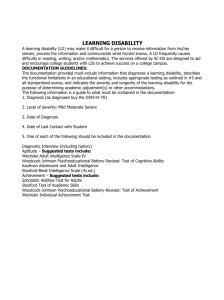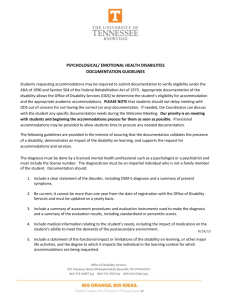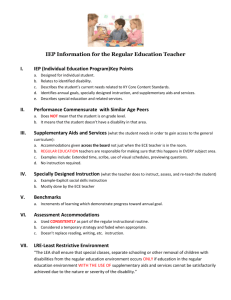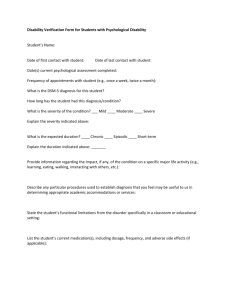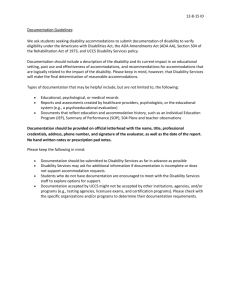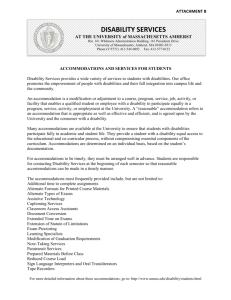Learning Disability - University of North Carolina Wilmington
advertisement
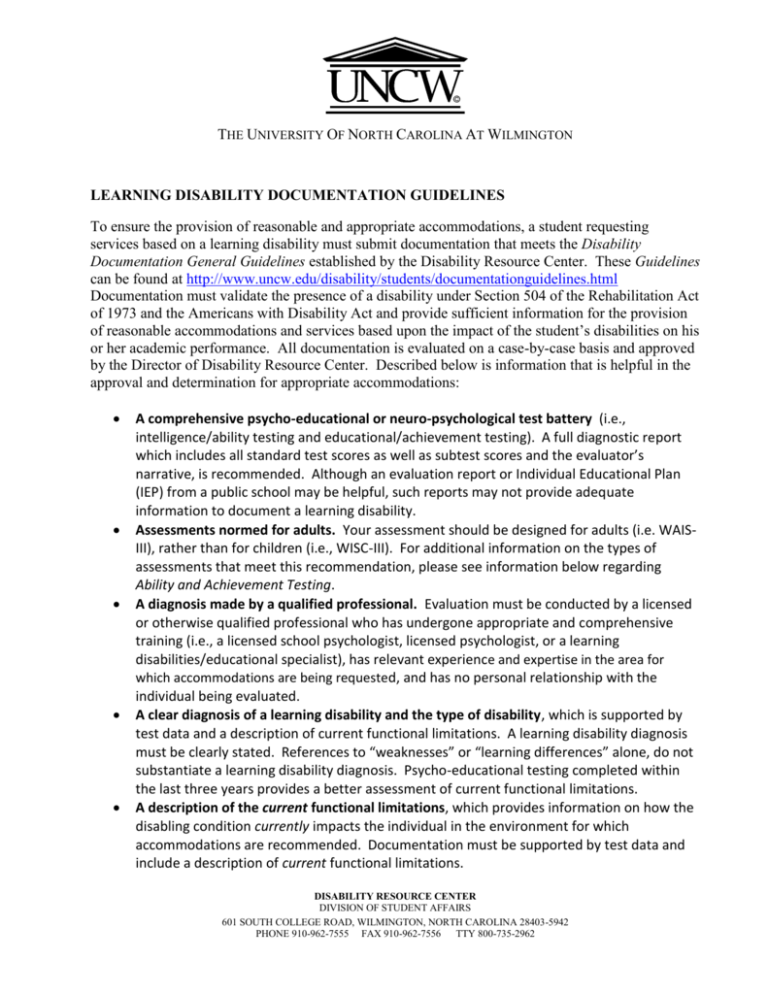
THE UNIVERSITY OF NORTH CAROLINA AT WILMINGTON LEARNING DISABILITY DOCUMENTATION GUIDELINES To ensure the provision of reasonable and appropriate accommodations, a student requesting services based on a learning disability must submit documentation that meets the Disability Documentation General Guidelines established by the Disability Resource Center. These Guidelines can be found at http://www.uncw.edu/disability/students/documentationguidelines.html Documentation must validate the presence of a disability under Section 504 of the Rehabilitation Act of 1973 and the Americans with Disability Act and provide sufficient information for the provision of reasonable accommodations and services based upon the impact of the student’s disabilities on his or her academic performance. All documentation is evaluated on a case-by-case basis and approved by the Director of Disability Resource Center. Described below is information that is helpful in the approval and determination for appropriate accommodations: A comprehensive psycho-educational or neuro-psychological test battery (i.e., intelligence/ability testing and educational/achievement testing). A full diagnostic report which includes all standard test scores as well as subtest scores and the evaluator’s narrative, is recommended. Although an evaluation report or Individual Educational Plan (IEP) from a public school may be helpful, such reports may not provide adequate information to document a learning disability. Assessments normed for adults. Your assessment should be designed for adults (i.e. WAISIII), rather than for children (i.e., WISC-III). For additional information on the types of assessments that meet this recommendation, please see information below regarding Ability and Achievement Testing. A diagnosis made by a qualified professional. Evaluation must be conducted by a licensed or otherwise qualified professional who has undergone appropriate and comprehensive training (i.e., a licensed school psychologist, licensed psychologist, or a learning disabilities/educational specialist), has relevant experience and expertise in the area for which accommodations are being requested, and has no personal relationship with the individual being evaluated. A clear diagnosis of a learning disability and the type of disability, which is supported by test data and a description of current functional limitations. A learning disability diagnosis must be clearly stated. References to “weaknesses” or “learning differences” alone, do not substantiate a learning disability diagnosis. Psycho-educational testing completed within the last three years provides a better assessment of current functional limitations. A description of the current functional limitations, which provides information on how the disabling condition currently impacts the individual in the environment for which accommodations are recommended. Documentation must be supported by test data and include a description of current functional limitations. DISABILITY RESOURCE CENTER DIVISION OF STUDENT AFFAIRS 601 SOUTH COLLEGE ROAD, WILMINGTON, NORTH CAROLINA 28403-5942 PHONE 910-962-7555 FAX 910-962-7556 TTY 800-735-2962 Recommendations for appropriate accommodations A specific request for accommodations must be supported by an accompanying rationale. A connection must be established between a requested accommodation and the impact of a student’s current functional limitation in the academic environment. Along with the above information, transfer students are encouraged to provide written verification from their previously attended school, which includes the dates served and the accommodations used. 7-24-12 DISABILITY RESOURCE CENTER DIVISION OF STUDENT AFFAIRS 601 SOUTH COLLEGE ROAD, WILMINGTON, NORTH CAROLINA 28403-5942 PHONE 910-962-7555 FAX 910-962-7556 TTY 800-735-2962

